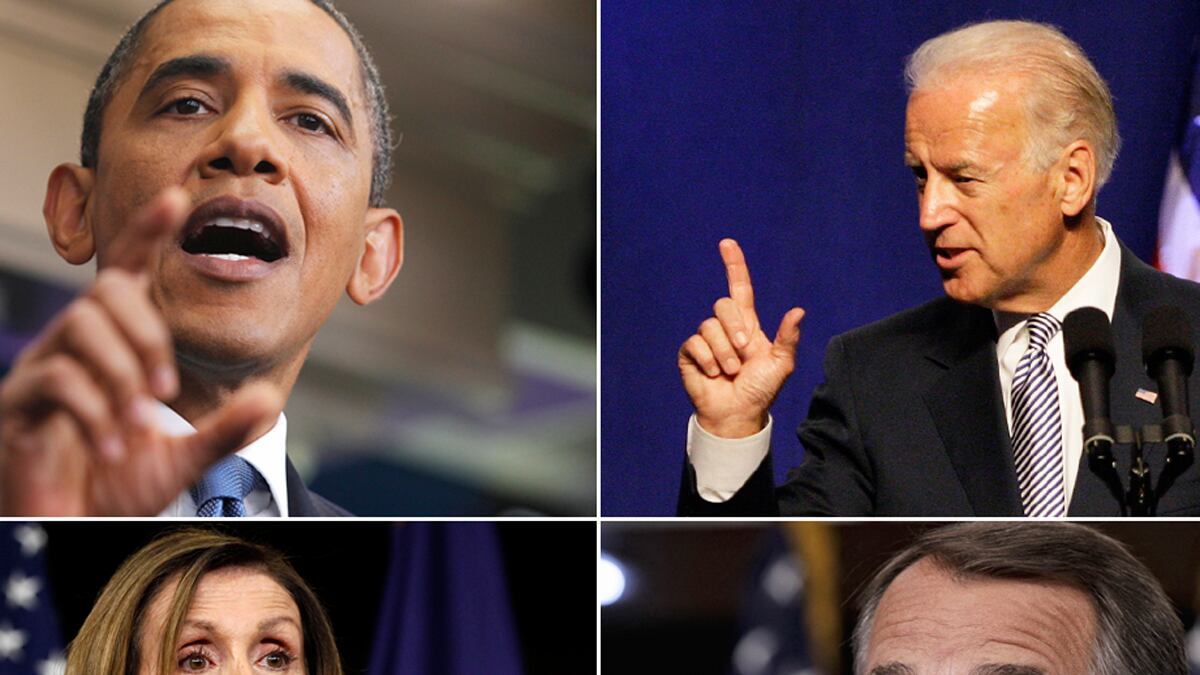I’m so confused about all this hysterical talk about a debt ceiling. I thought we dealt with this in December, or maybe April.
No, those were the Bush tax-cut extensions and the federal budget for this year. This is a different, and even more arcane, fiscal issue.
In that case, can we start with the basics?
Sure. Before 1917, Congress had to give approval every time the government wanted to raise more money through debt. That year, a new law created a debt ceiling—which, ironically, was supposed to make things easier, allowing the Treasury to borrow as it pleased up to that limit without bothering Congress. But government borrowing has increased steadily since then, and we’ve had to increase the limit repeatedly—10 times in the last 10 years. And we’re about to hit that limit again.
When are we going to get there?
The consensus is August 2, but if you think you've heard that the limit was impending before that date, you have. Back in May, we actually hit it—but there was no agreement on a deal. So the Treasury Department did some fancy footwork and found some headroom by halting payments into government pension plans. Of course, that’s just a temporary fix, as the government is obligated to make up for the lost funds eventually. But it gave Congress a chance to get back to squabbling about other things, until reality intruded again in the last few weeks.
So if they came up with workarounds back in May, why should we believe that August 2 is really the deadline? Can’t Treasury Secretary Tim Geithner pull a trick like that again?
Maybe, but shhh! He doesn’t want Congress to know. Reuters reports that the Treasury Department is looking at what it can do if Congress doesn’t hit the deadline—prioritizing some payments, perhaps, or delaying others. But Geithner was reportedly trying to keep it under wraps, lest politicians take it as license to lose their urgency. There are a few other alternatives, too. Some say the president can simply rule that the U.S. can’t default under the 14th Amendment, and bypass the process. No one knows whether that would hold up in court, but on Friday the Treasury effectively ruled out trying it anyway. In the spring, Senator Pat Toomey (R-PA) suggested a law that would simply say that the U.S. had to pay its debts first, but Treasury dispensed with that idea, too, saying investors would see through it and know that it meant the government couldn’t meet all its obligations.

Why can’t we just stop spending money?
Sorry, but that won’t do a thing about the debt ceiling. Here’s the problem: We’re not talking about raising the ceiling to pay for future expenses. We need to raise it to pay for things we’ve already bought. Think of it like paying your mortgage: You can forswear buying that shiny new flat-screen TV next week, but you’ve still got to make your payment on the house you bought last year. And to pay off those things we’ve already bought, we need to borrow more money. It’s a bit like paying off one credit card with another, and the limit on the card right now is pretty high: We borrow $125 billion every month to meet our debt obligations.
I see. But since the U.S. doesn’t have a mortgage on a house, what are the bills we have to pay?
It’s all sorts of stuff—government paychecks, welfare benefits, outstanding bills from defense contractors. The thing that has many watchers most concerned is payouts to government bondholders. Those are the folks who have bought Treasury bonds and now want their money out—in other words, lenders to the federal government. And as anyone who’s been late on a credit-card payment knows, failing to pay off your lenders is bad news. In addition to calls and letters from collection agents, you also face a lowered credit score. On a national level, that means default, which would almost certainly result in the United States' credit score being downgraded by the major ratings agencies.
So what? Is this going to affect me?
As long as you’re not a bondholder trying to get your money back or a government employee waiting on a paycheck, you probably won’t be directly affected at first. But you might want to get a head start on freaking out anyway. A U.S. default would likely have two immediate results. First, it would severely roil markets—and in case you hadn’t noticed, the nascent recovery is extremely fragile. Second, it could radically increase the government’s future cost of borrowing, which would make the national debt increase even faster and make it harder to reduce the deficit.
How bad would all that be?
No one really knows, because it’s never happened here before. Interest rates on other instruments, like credit cards and mortgages, would likely increase. With credit tight and businesses feeling insecure about the future, there could be job losses in the hundreds of thousands. And while governments have defaulted in the past—like Argentina in 2001—none have been as big or as crucial to international trade as the U.S. is, so no one can predict how the world economy might be affected. Of course, the government could respond by radically slashing spending on services, employment, and the like in order to pay debts, but that would also be economically risky. Almost no one believes it’s a good idea to let America hit its debt ceiling—the only debate is over how bad it would be.
Well, that’s unsettling. So why in the world would we not increase the debt ceiling?
Three words: politics, politics, politics. Everyone says raising the debt ceiling is important: President Obama said Monday that not raising the ceiling would be “irresponsible.” Geithner has said it would be “catastrophic.” House Speaker John Boehner said, “I frankly think it puts us in an awful lot of jeopardy, and puts our economy in jeopardy, risking even more jobs." Senate GOP Leader Mitch McConnell insists, “Nobody is talking about not raising the debt ceiling.” (Memo to Mitch: Here’s a couple.) But both sides have now come around to the Republican position that the increase ought to come with major reductions in federal spending—as in, trillions of dollars’ worth. But Democrats are adamant about restricting the size of cuts to programs like Medicare, Medicaid, and Social Security, while Republicans have flatly ruled out any measure that increases revenue. (The Democrats want to eliminate some tax loopholes.)
What happened over the weekend?
After several other approaches sputtered to a halt, the latest strategy was for congressional leaders to meet with President Obama at the White House. The central players at this point appear to be Obama and Boehner, who are newly best buds ever since that golf outing. (OK, so maybe not best buds, but better.) The two sides appeared to be edging toward a long-term deal—Democrats want some package that would raise the ceiling high enough to get past the 2012 election, hoping to avoid a political-economic crisis on the eve of Obama’s reelection attempt. And it looked like they were pretty close. But when news leaked that tax increases were on the table, Boehner faced a revolt in his party and pulled out, saying he wanted a short-term deal. On Monday, Obama flatly rejected a short-term deal, saying he wanted a more ambitious plan that would have a long-term impact on the deficit. The road ahead is uncertain, but Obama has said Congress must reach a deal by July 22 in order to avoid catastrophe on August 2.
Yikes. What should I be doing?
We recommend keeping your fingers crossed. That, or stockpiling gold.






